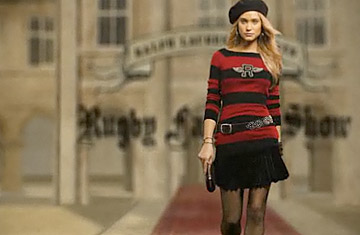
A Ralph Lauren Rugby virtual fashion show
Soon you may not have to be an A-list celeb, department-store buyer or magazine editor to get a front-row seat at a fashion show. As the luxury and fashion industries continue to struggle with sagging retail sales and consumers' diminishing interest in $2,000 It bags, designers are looking for alternative ways to show their wares. And more and more of them are turning to the Internet for a bigger audience and to shrink their overhead.
"The cost of a fashion show has become prohibitive," says David Lauren, Polo Ralph Lauren's marketing chief. "And because of the economy, fewer members of the press and buyers are making the trip to New York to see the show." The result is that many designer-initiated brands — including the less-expensive lines, like Donna Karan's DKNY, that are presented during New York Fashion Week — are rethinking the traditional fashion show. This fall the British designer Alexander McQueen made a splash by live-streaming his Paris show on his website. The season before, Louis Vuitton live-streamed its show on Facebook. And Lauren is the mastermind behind a new initiative to present his company's brands in virtual fashion shows as opposed to have-to-be-there runway extravaganzas.
On Dec. 11, Rugby, Ralph Lauren's collegiate brand, will show its holiday collection in an online fashion show that Lauren calls a mix between Harry Potter and Rock Band. Instead of walking down a real runway, the models will be walking on a treadmill in an office with a green screen behind them. Once the clip is produced, a virtual backdrop will be superimposed so that it will look as though the models are walking through New York City or a college campus, or jumping off flying books. The idea, says Lauren, is to bring a cinematic feeling to the brand's advertising images. And instead of the company's spending $1.5 million on an audience of approximately 700 members of the fashion press and department-store buyers, the virtual show will cost less than $50,000 to produce and is expected to attract more than 40 million page views.
One advantage to replacing the traditional biannual runway show — which features clothing that won't be available in stores for another six months — is that designers can close the six-month gap between the show and the products' availability. Ideally, consumers who watch a show online would then be able to click on a product they see and buy it immediately. "Now we can serve the industry and our customer simultaneously," says Lauren, "which is critical to the survival of this industry."
Historically, high-end fashion brands have not fared well when they've relied solely on virtual fashion shows. In 1998, Helmut Lang made a statement when he replaced one season's runway showing with a video recording of a show that went up on his website and was distributed to editors on discs. But the reaction was lukewarm, and the following season Lang returned to the runway. More recently, brands like Viktor & Rolf and Yves Saint Laurent have experimented with online shows.
Next spring Polo Ralph Lauren is planning virtual shows for its less-expensive Lauren line as well as its children's line. But the company isn't ready to present its most prestigious line, the Ralph Lauren collection, online. "It's certainly up for debate," says Lauren. "It's making us think differently about how we show our product and how we can show the Ralph Lauren collection."
